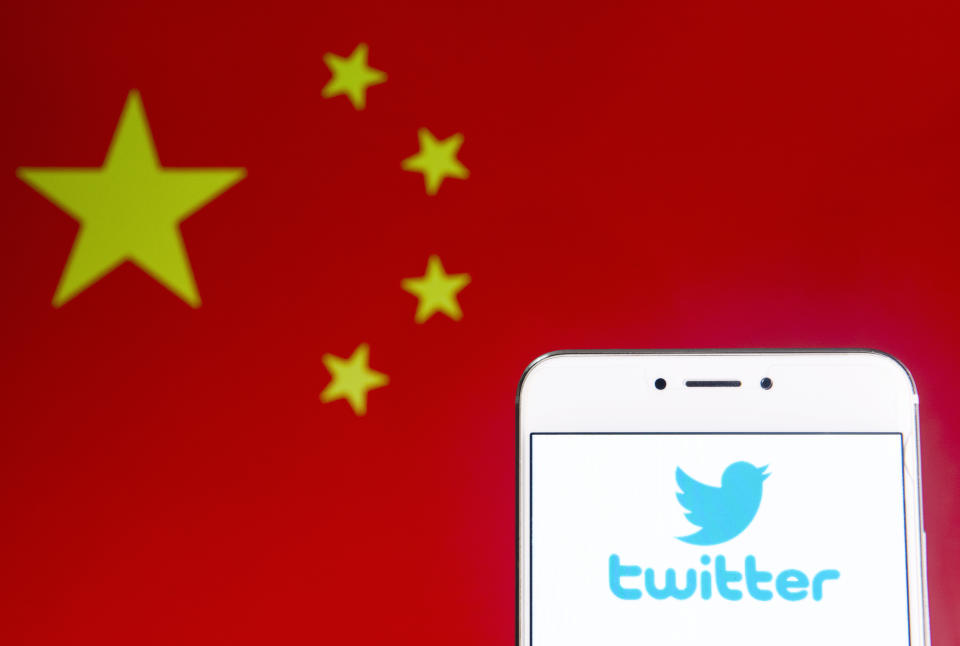What the China-backed Twitter army says about Hong Kong and Huawei
Twitter and Facebook may be blocked in China, but that hasn't stopped them from becoming the go-to platforms for China's propaganda efforts abroad.
On Tuesday, Twitter suspended 936 accounts originating from China for “coordinated state-backed operation” including spam and fake accounts. Shortly after, Facebook followed suit, blocking accounts of similar activities related to Hong Kong protests.
Yahoo Finance analyzed tens of thousands of tweets from those accounts, which point to a concerted effort to sway U.S. opinion on a number of issues ranging from the Hong Kong protests to the embattled Chinese telecom giant Huawei.
The Twitter accounts have been supportive of the controversial change of Hong Kong’s extradition law, which would allow fugitives to be sent to China. They also spoke out for Huawei, which has been put on the Entity List by the U.S. government. Guo Wengui, an exiled Chinese billionaire who lives in the U.S., has also been a target of attacks by the accounts.
The majority of the accounts were established years before the Hong Kong protests erupted in June and some of them have previously tweeted in languages other than English and Chinese, including Indonesian and Arabic. Besides pro-Chinese government content, the accounts also retweeted other users on a variety of issues, including finance and sports, often citing media outlets.
Clint Watts, a Foreign Policy Research Institute fellow, said this is the “textbook” approach of buying and taking over accounts with certain years of history, in order to be trusted by Twitter and other users to get more engagement.
“You start with the news because that would attract people's eyeballs. It makes them stick out when they just suddenly start talking about an issue,” said Watts.
The suspended accounts have been vocal about its pro-Beijing stance when the anti-extradition law protests broke out in Hong Kong in June. The core messages it tried to share was that the Extradition Law is much needed and good for the safety of the city.
“The amendment of the Extradition Law is in line with the spirit of Hong Kong's legal system. It is to better safeguard social justice and what we need as a society,” one tweet in Chinese read.
As the proposal drew major backlash and prompted constant protests in Hong Kong, the tweets condemned “violent protesters” and characterized protesters as “rioters” who are manipulated by external forces like the CIA in the U.S.
“These opposition groups organized protests to try to screw up Hong Kong. They beautify violence, smother the rule of law, and push young people who are not deeply involved in the political into the whirlpool. They want to push Hong Kong into recession and ruin people's livelihoods, and danger the rule of law and the future of Hong Kong,” tweeted another account.
Focus on domestic politics

Hong Kong protests are not the only issues the accounts care about. Huawei, the Chinese telecom giant has also received more mentions as it got caught in between the U.S.-China trade tension.
“To those who question, doubt and insult #Huawei, do you even know Huawei? Have you carefully studied Huawei’s history of hardships? Don’t you believe that such a powerful high-tech company can be born on the land of China?” one tweet read. “Today is the 40th anniversary of China's reform and opening up and Huawei is the best example. It is a miracle created by the Chinese people's spurt of wisdom and creativity after they get rid of the ideological shackles! Be more objective and rationale!”
Huawei didn’t reply to request for comments. Its CEO Ren Zhengfei previously told Yahoo Finance in an exclusive interview that the company doesn’t want to be part of the trade war and will not ask the Chinese government for help. Meanwhile, Huawei has launched its own PR campaigns to change its perceptions in the West.
Among the tweets, Guo Wengui, the exiled Chinese billionaire who moved to the U.S. and became a frequent critic on the Chinese Communist Party and its highest leader Xi Jinping, was a most common target. Most of the accounts focus on discrediting Guo and accusing him of spreading misinformation.
“Certainly those are all the things that the party has been and the state has been worried about,” said Adam Segal, director of the Digital and Cyberspace Policy Program at the Council on Foreign Relations. “The Chinese are really trying to shape the narrative to create a more positive view of China, and even have people to understand their side and take their side.”
It’s unclear when the accounts caught Twitter’s attention. The Hong Kong protests have been a rare case for China, attracting global attention due to the widespread media coverage and its impact on the financial markets, Watts said.
The key topics from the tweet also highlight the agenda of China’s propaganda efforts, which experts say are different from Russians, who have been operating their own online disinformation campaigns.
“I think much of the Russian effort is really about creating discord and undermining trust in institutions in the U.S. So far the Chinese use of it has tended to be limited to issues that the Chinese consider being internal issues or sovereignty issues,” said Segal. “Those kinds of things have not reached the level of Russian interference with U.S. politics or elections, but that would clearly be a possibility for China if it decides that would be a useful kind of mechanism.”
Krystal Hu covers technology and China for Yahoo Finance. Follow her on Twitter.
Read more:
Huawei CEO on partnerships with U.S. companies: 'We have to be more cautious"
Read the latest financial and business news from Yahoo Finance
Follow Yahoo Finance on Twitter, Facebook, Instagram, Flipboard, SmartNews,LinkedIn, YouTube, and reddit.
